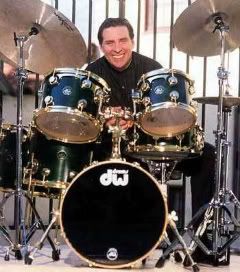
by Pico
Mike Clark assured his place in jazz history for the severely funky rhythms he laid down all over Herbie Hancock’s 1974 fusion classic Thrust. His knotty beats managed to make me forget about his Headhunters predecessor Harvey Mason and they probably should have been patented. If you hadn’t gotten Thrust yet, take a short break from this review and order it now. I’ll wait.
Did you get it? Good. Now, let’s fast forward to what Clark is up to these days.
This underrated drummer was recently approached by Talking House Records about participating in an uncommon project the label has undertaken. Talking House wanted to sign and record new albums by lesser-known jazz musicians whose innovations helped in shaping the sound of jazz over the last fifty years. By targeting guys who made such contributions and somehow flew under the radar, this project seeks to bring long-delayed recognition to them while they’re still out there doing their thing.
Called the “Blueprints of Jazz,” the first three artists to be featured are Clark, saxophonist Billy Harper and another drummer, Donald Bailey. All three are due for their B.O.J. albums to drop today, but the first volume—by Clark—is our focal point.
It’s probably useful to state up front that Blueprints Of Jazz, Vol. 1 isn’t Thrust, Vol. 2. This ain’t no Headhunters record, it’s straight up jazz. But Clark is no less able to apply his skills on the skins here as he’s been able to do for funk jazz.
There’s another cause for relief; for Blueprints Of Jazz, Vol. 1, Clark brought in some heavy hitters to help him out on this record: Christian McBride on standup bass, Patrice Rushen on piano, Jed Levy on tenor sax, and Donald Harrison on alto sax. Harrison also brought along his nephew, the fast-rising young trumpeter from New Orleans, Christian Scott.
With this crew, Clark is able to keep it funky, within the realm of old-school jazz. It’s the same kind of hard-groovin’ sixties jazz Derrick Gardner was keeping alive last year with A Ride To The Other Side.
Still, for an acoustic, straight-ahead effort, the choice of Rushen at piano might seem at first a peculiar one; she made her name on the R&B crossover success she had in the seventies and eighties. But Rushen comes from the jazz tradition, and any notion that she lost her chops in that area are shot down by her playful right hand on the hard bop of “In The House.”
“Like That” is a 4/4 tune, but Clark adorns it with it so much polyrhythms, you’d swear that it’s running on some odd time signature. After the smokey, sultry “10th Ave. 1957” comes Clark’s busy kit work that underpins “Past Lives.” With Rushen sitting this one out, both Levy and especially Harrison put in some enjoyable solos, while McBride and Clark are locked into some vicious groove.
Clark’s self-penned “Conchita’s Dance” reveals his swinging abilities in a loose manner reminiscent of Elvin Jones’ work under John Coltrane. Harrison keeps it in the spiritual mode with some passionate lines, while Rushen’s thick, two handed chord voicings also fit the song perfectly. The last track cut takes the proceedings home on a soft landing with Billy Eckstine’s “I Want To Talk About You,” which stars some gorgeous alto sax by Harrison and some nifty brushwork by Clark.
The cut that best demonstrates Clark’s unique ability to lay down such an intricate funky rhythm can me found on a composition he co-wrote with Levy for the Headhunters, “Loft Funk.” Scott’s big, brassy tone briefly upstages the leader during his solo, however.
After a notable 35 year recording history, it’s high time that much of the world gets introduced to one of the funkiest jazz drummers in Mike Clark. The title Blueprints Of Jazz, Vol. 1 is a metaphor for architecture, but the medical field is a more apt comparison, because Clark with his all-star lineup is putting on a clinic.
Here’s some video goodness of Clark performing “Loft Funk” with Levy and an organist I can’t identify. Even though his solos are impressive enough, it’s Clark’s main groove during the song using what he calls one of his “signature beats” that sets him apart:
- Matthew Shipp – ‘The Cosmic Piano’ (2025) - June 17, 2025
- Ivo Perelman & Matthew Shipp String Trio – ‘Armageddon Flower’ (2025) - June 16, 2025
- Claudio Scolari Project – ‘Bloom’ (2025) - June 12, 2025



Clark is a genius and this recording is a masterpiece.